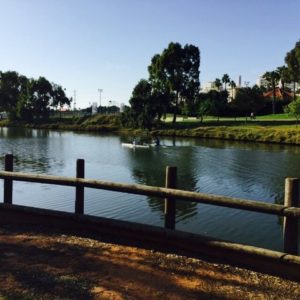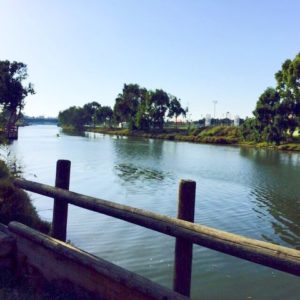FOUR YEARS AGO, my mother was dead, I had lost my job at Newsweek, and I was driving up the slopes that lead away from my house, with no direction as to where I was headed. There was no one to look after but myself. I slowed down, opened the windows, and turned on the radio. A song by Arik Einstein, the legendary Israeli singer and musician, was playing, and I began singing the words, simple words about a Saturday morning, turning them over in my mind, letting the memories flood me.
I remembered my own languid Saturdays in the first apartment my partner and I owned: a two-and-a-half-room apartment on the first floor of a high-rise, where I would sit with my legs hanging over the edge of the balcony, studying the people walking about down below — my first-born daughter, Jasmine, doing a Barbie puzzle on the floor. Even then, I grew herbs in the window box, and pink bougainvillea that drooped lazily over the balcony. I remembered weekends boating on the Yarkon River with my beloved father-in-law, where he would sing to us in the Russian of his childhood. And as I listened to the words of the song, alone in my car, I realized with a start that I had mastered, after all, the Hebrew language. I had mastered it despite years of unwillingness to speak a language other than my precious mother tongue, English.

Today, I’m thinking of the thousands of refugees fleeing their own countries, seeking refuge where there is little. Apart from serious physical and economic hardships, they must overcome the hurdle of a new language while clinging to the old. My father-in-law fled Belarus in the former USSR during the reign of Stalin in 1936. He left behind his home town, the friends he had grown up with, and family members, including a brother who could not leave and who was killed. For years, my father-in-law was unable to return to his hometown, and he wandered between the two languages of Hebrew and Russian. His Hebrew was good, but it was Russian literature that he read, and news reports in Russian that he listened to on a tiny transistor radio every afternoon, right up to his death.
I grew up in North Yorkshire, England. I read Middlemarch and Jane Eyre. I wrote stories in math exercise books, and scrawled poetry during geography lessons. At age 15, my brother died in a motorcycle accident. My life as I had known it evaporated. Less than a year after his death, my parents sent me to a boarding school in the Negev Desert of Israel. For a year and a half, I lived with English speakers from the US, Canada, and Zimbabwe. A wild bunch, we were forbidden to talk to the Hebrew-speaking Israeli teenagers studying in the parallel boarding school there. I couldn’t have cared less. I had no wish to learn a language that might form a bridge for me into the country I had been forced to live in.
After graduating, I began studying English Literature and Communications at the Hebrew University of Jerusalem. This was partly out of a lack of choice — I couldn’t study in Hebrew — but also because of a deep wish to hold on to the roots of a language I had grown up with and loved. I read Chaucer, Browning, Austen, but also a good deal of American literature, and I adored it all. Hebrew was a closed door for me, or at least a door I was unwilling to open, until I met Raz, a tall, mysterious figure who did not quite fit in either.
At first, we conversed in English. Raz’s English was vaguely archaic; I remember sitting on the balcony of the apartment I shared in Jerusalem with two British girls one summer evening. There was a chill in the air. “Shall I bring you a mantle?” he asked me, and I laughed at the odd choice of words, and wanted to know him better. His name, he told me, meant “secret” in Hebrew, but when read backward it meant “stranger.” This, ultimately, led me to start picking up odd words in Hebrew, at first haltingly. The words sat awkwardly in my mouth but, with Raz, I insisted on getting them out. “At mevina?” he would ask, Do you understand? And I would nod and muddle through until eventually I did understand him and the language on which he had been raised. Raz made me a tape of Hebrew songs, and I would listen to them, breaking up the words into syllables, mishearing and creating my own words to sing along with. At the time, I had no idea what I was listening to, but gradually I began putting the sounds and the textures of the words together, and I understood.
While completing our studies, we worked together at a children’s psychiatric hospital, where I learned to curse perfectly in Hebrew. The children there did not judge me for my thick British accent and didn’t care if I muddled up the feminine with the masculine; they had their own problems to contend with.
Raz and I had three children of our own as the years went by, forcing me into more Hebrew as I followed them through kindergarten and school. I learned, more slowly than my children, songs for Jewish holidays and birthdays. I suffered, tripping up over words that everyone else seemed to know effortlessly. “In the silence the verbs surround me / like faces of strangers,” writes Joseph Brodsky in a poem translated by W. S. Merwin, summing up perfectly how I felt for so many years.
But I still stuck to what I knew best: English. I went for a job interview as an assistant at Newsweek’s foreign bureau in Jerusalem. As soon as Jeffrey Bartholet, the bureau chief, a soft-spoken, serious American, opened the door and his dog, Hazel, jumped up at me, I knew I had the job. I wasn’t a journalist but I grew up with dogs, and it was instant affection between us. Bartholet was afraid I would be frustrated; he had read some poetry I’d sent ahead of the interview — I had done this because I’d never worked in journalism but wanted to prove I could write. Bartholet was also concerned I would be bored at what seemed then like a quiet time in Israel, a time of impending peace under Prime Minister Yitzhak Rabin. You’ll have plenty of time to write your poetry, he said ruefully.
My Hebrew wasn’t that sharp back then, and I spent hours poring over the Hebrew-English dictionary in the office and chasing after Hazel, who was dead set on eating those thin, rustling pages. Then, three weeks after starting work, Rabin was assassinated in Tel Aviv. Bartholet was abroad, and I got my first taste of foreign journalism that night, sitting in my pyjamas long past midnight, interviewing people over the phone for a story that was written out of New York, just hours before deadline.
I took to journalism immediately. I loved the hard language of this genre; I enjoyed watching stories being spliced together, and thrived on the excitement of those years. But most of all I loved the freedom and the anonymity that my job gave me, the ability to cross checkpoints and borders into other people’s lives. I spent a lot of time in those early years simultaneously translating from Hebrew to English the words of right-wing Jewish extremists living in isolated outposts, of left-wing demonstrators, of singers and random people on the streets. I met settlers who wanted their Arab neighbors off the land, whatever the cost. I choked on some of the words; I stumbled over the words of bereaved mothers who had lost their sons, and did my best to translate the clichés trotted out by politicians without losing focus. And I began doing my own interviews, including ones in Arabic, translated for me by Nuha Musleh: a feisty lady from Ramallah. I met Palestinian women who also wept over their sons; I met a would-be suicide bomber incarcerated in Neve Tirza Women’s Prison, and shivered when she told me she was sorry that she had not managed to kill any Jews. I met Amneh Munah, a Fatah activist who lured a Jewish teenager to his death — and for this I learned some Arabic, although not enough to be able to talk to her without an interpreter, to speak and understand directly. For language is the ability to interpret the nuances of how people think and what they feel through a specific choice of words, and I wanted to understand her beyond the headlines.

Languages are built on roots, like trees. I’ve thought a lot about this while wandering around the forest near my home in the Ella Valley. One time, I went to the forest on a particularly cold and gray day. Rain had fallen through the night and there was a softness to the hills. I could hardly see the trees through the mist, although I knew they were there, waiting for me. I stood for a while and let my eyes become accustomed to the pale colors merging into each other. I could make out the outlines of the tree trunks; I could see where the branches ended and the air began, low clouds forming in the distance. There is a puzzle waiting to be solved through the mist of translation so that others can enjoy it, wherever they are in the world.
The Hebrew language is particularly layered — an infrastructure of biblical, cultural, and political roots. I did not learn Hebrew in school, nor did I ever attend a course that might have given me a base upon which to build. I learned it backward, by trial and error. My children still laugh at my mistakes, at my British accent and my consistently bad spelling. Perhaps this is why Nizar Qabbani’s words, translated by Bassam K. Frangieh and Clementina R. Brown, resonate for me:
I want to travel away from the dictionary
And to leave my lips
I am tired of my mouth
I want a different one
Which can change
Into a cherry tree or a match box
A mouth from which words can emerge
Like nymphs from the sea
Like white chicks jumping from the magician’s hat.
Today, I earn my living as a literary translator, turning words of poetry and fiction over in my mind, words of black on white that change color as the shadows fall on them. I hold them up to the light and eventually they shine. They speak of days gone by, of subverted thinking, of future hopes. And, next month, I’m beginning a course in Arabic. This time I’ll start from the beginning and build slowly.
¤
LARB Contributor
LARB Staff Recommendations
Refugee or Migrant
Should we call them refugees or migrants? It is now common practice in Europe to enforce a heavy-handed, arbitrary categorization of those fleeing...
All Borderlands Are Ghost Lands
In the end, all borderlands are ghost lands, and every border is painted in blood. Many of those fleeing today, caught in their exhaustion and...
Did you know LARB is a reader-supported nonprofit?
LARB publishes daily without a paywall as part of our mission to make rigorous, incisive, and engaging writing on every aspect of literature, culture, and the arts freely accessible to the public. Help us continue this work with your tax-deductible donation today!
:quality(75)/https%3A%2F%2Fdev.lareviewofbooks.org%2Fwp-content%2Fuploads%2F2015%2F10%2FYarkon3-jonathan%40lareviewofbooks.org_.jpg)